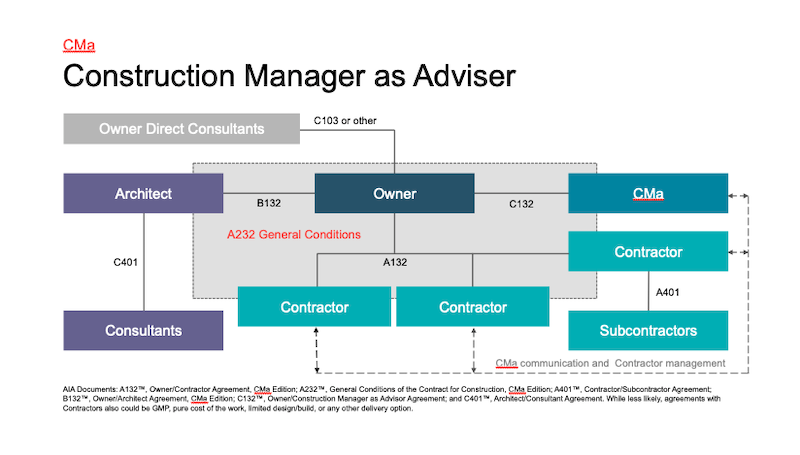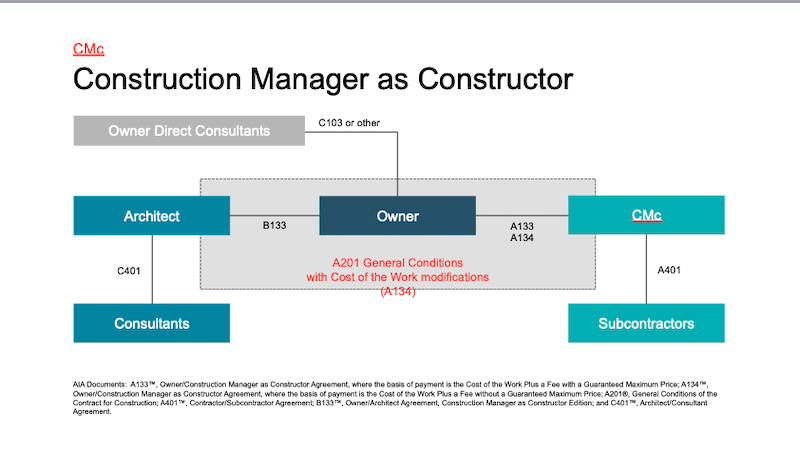On Nov. 15, the American Institute of Architects (AIA) plans to release its new and updated Construction Manager as Constructor (CMc) family of contract documents. Next February, the AIA will release its updated Construction Manager as Adviser (CMa) family of documents.
These documents get updated on a 10-year revision cycle.
The AIA divides its contract documents into nine families, organized by delivery method. These include families for design-bid-build (the most widely used contract model), design-build, and integrated project delivery, as well as contracts that specifically cover interiors, small projects, and digital practices. The design-bid-build document family was updated in 2017.
Under CMc, the Construction Manager comes on the project during the preconstruction phase to provide early collaboration. In the construction phase, the CM does the construction work, as if it were a General Contractor.
Under the CMa, the Construction Manager is also retained by the owner for early collaboration during the preconstruction phase. But the CMas don’t perform the construction work. The CMa documents are designed for complex projects with more than one prime contractor. During the construction phase, the CMa coordinates and manages the contractors, as well as providing cost estimating and other functions.
Susan Van Bell, Senior Director and Counsel – AIA Contract Documents Content, tells BD+C that the AIA solicited input from CM practitioners about revisions to the documents so that they’d better reflect current practices.
From those conversations, CMs suggested that one change they wanted was a way to tailor the document for the scope of preconstruction services without having the standard contract language be too restrictive.
Van Bell says the 2019 CMc revision addresses this issue by inserting “fill points” into the contract where more preconstruction details can be identified. The update also makes some edits to the standard preconstruction services scope.

A schematic of the family of documents for Construction Manager as Advisor.
The CMc documents now include insurance and bond exhibits, which had been added to the design-bid-build document family in its 2017 revision. Van Bell says there are also new exhibits for both the CMc and CMa documents that cover the role of the CM in sustainable projects.
The revised CMa documents clarify the CMa’s role in such areas as analyzing and coordinating the contractors’ schedules. The CMa is also the responsible party for managing a project’s digital information systems. “We clarified the communication process,” Van Bell says. The 2017 updates that required the establishment of protocols for digital data and BIM were carried into the CMc and CMa updates.
Related Stories
| Aug 11, 2010
PCA partners with MIT on concrete research center
MIT today announced the creation of the Concrete Sustainability Hub, a research center established at MIT in collaboration with the Portland Cement Association (PCA) and Ready Mixed Concrete (RMC) Research & Education Foundation.
| Aug 11, 2010
Study explains the financial value of green commercial buildings
Green building may be booming, especially in the Northwest, but the claims made for high-performance buildings have been slow to gain traction in the financial community. Appraisers, lenders, investors and brokers have found it difficult to confirm the value of high-performance green features and related savings. A new study of office buildings identifies how high-performance green features and systems can increase the value of commercial buildings.
| Aug 11, 2010
Architecture Billings Index drops to lowest level since June
Another stall in the recovery for the construction industry as the Architecture Billings Index (ABI) dropped to its lowest level since June. The American Institute of Architects (AIA) reported the August ABI rating was 41.7, down slightly from 43.1 in July. This score indicates a decline in demand for design services (any score above 50 indicates an increase in billings).
| Aug 11, 2010
Construction employment declined in 333 of 352 metro areas in June
Construction employment declined in all but 19 communities nationwide this June as compared to June-2008, according to a new analysis of metropolitan-area employment data released today by the Associated General Contractors of America. The analysis shows that few places in America have been spared the widespread downturn in construction employment over the past year.
| Aug 11, 2010
Jacobs, Hensel Phelps among the nation's 50 largest design-build contractors
A ranking of the Top 50 Design-Build Contractors based on Building Design+Construction's 2009 Giants 300 survey. For more Giants 300 rankings, visit http://www.BDCnetwork.com/Giants
| Aug 11, 2010
Balfour Beatty agrees to acquire Parsons Brinckerhoff for $626 million
Balfour Beatty, the international engineering, construction, investment and services group, has agreed to acquire Parsons Brinckerhoff for $626 million. Balfour Beatty executives believe the merger will be a major step forward in accomplishing a number of Balfour Beatty’s objectives, including establishing a global professional services business of scale, creating a leading position in U.S. civil infrastructure, particularly in the transportation sector, and enhancing its global reach.
| Aug 11, 2010
Construction unemployment rises to 17.1% as another 64,000 construction workers are laid off in September
The national unemployment rate for the construction industry rose to 17.1 percent as another 64,000 construction workers lost their jobs in September, according to an analysis of new employment data released today. With 80 percent of layoffs occurring in nonresidential construction, Ken Simonson, chief economist for the Associated General Contractors of America, said the decline in nonresidential construction has eclipsed housing’s problems.







